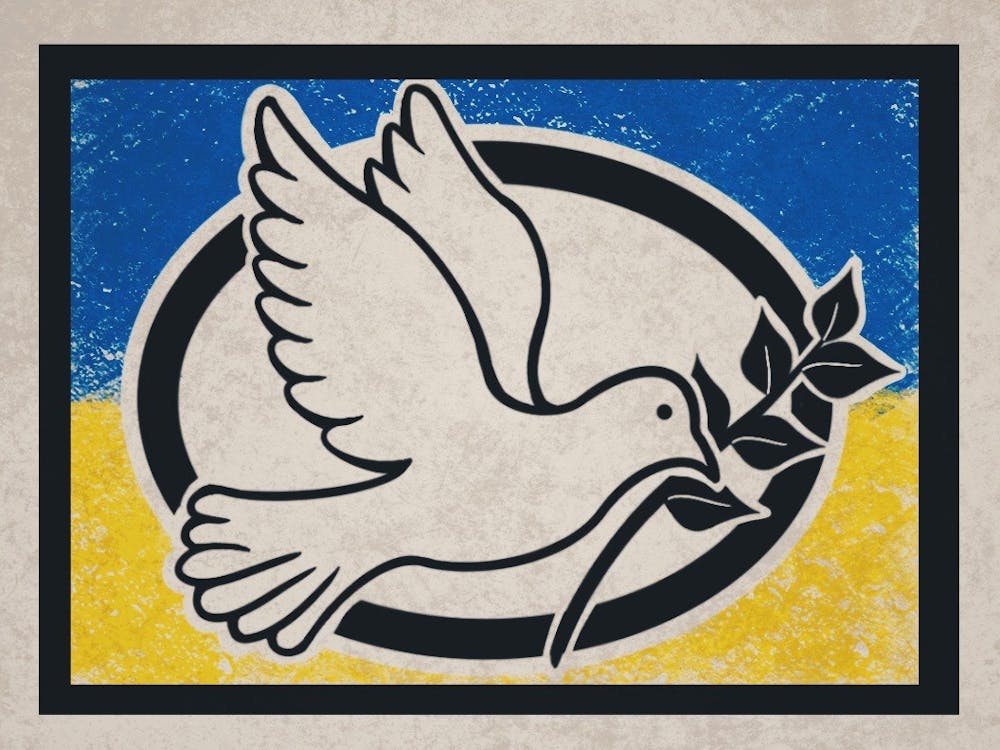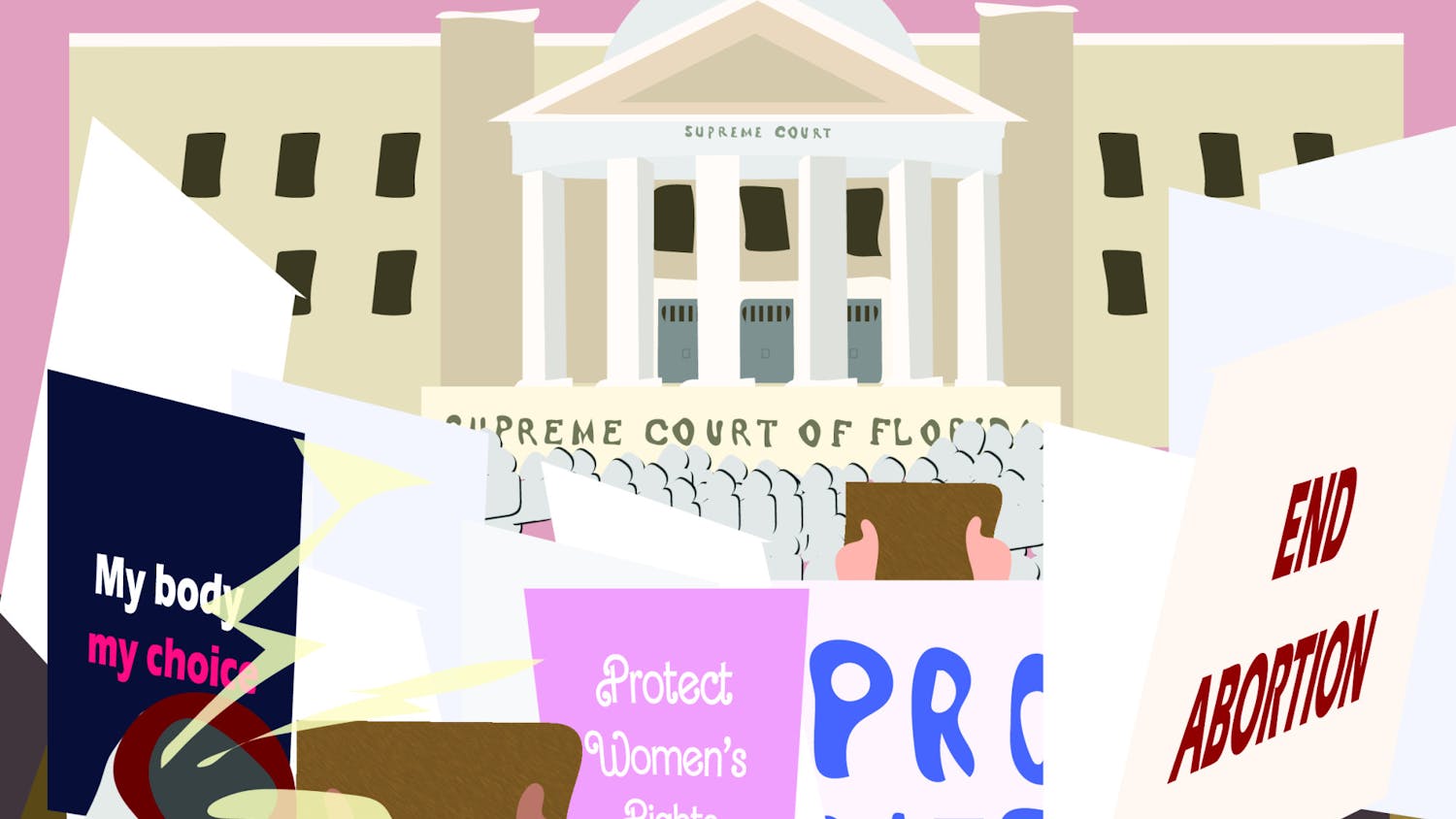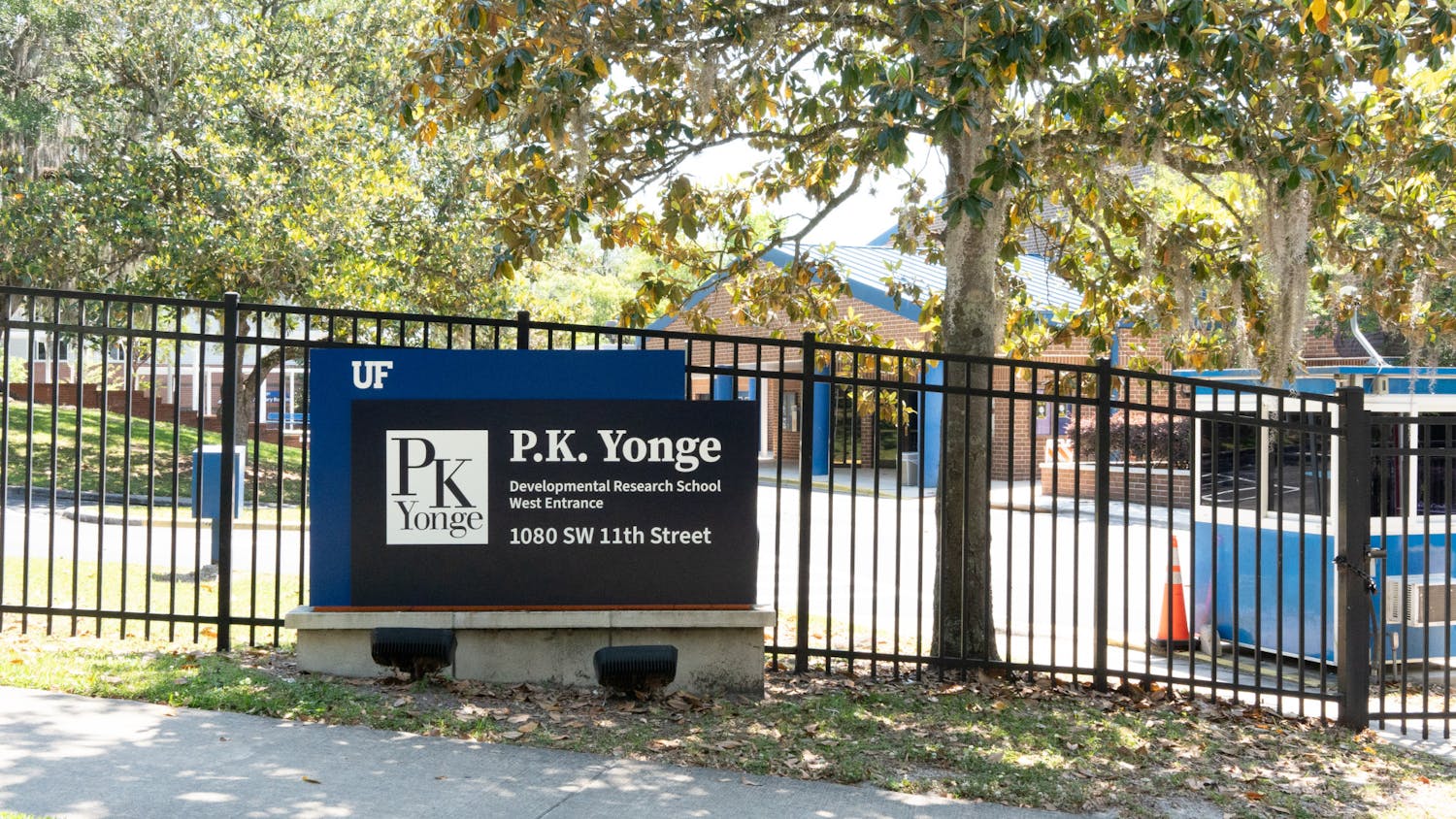Images of once-tall buildings and busy streets Iryna Kanishcheva used to walk in Lviv, Ukraine, are now billows of smoke and ashes on her television screen.
“I understand that all this can be destroyed with just one missile,” Kanishcheva said. “It’s really terrifying.”
Millions of Ukrainians are now refugees as a result of Russia's invasion that began Feb. 24. While members of the Gainesville and UF community have gathered to protest, some have found a different outlet to show solidarity with Ukraine: art. A mural, Instagram account and Century Tower lighting are a few among the many artistic efforts to raise awareness.
Taking a stand with murals
As a Gainesville art curator and the founder of the public art project 352walls, Kanishcheva aims to establish Gainesville as a vibrant cultural hub. Her project has created more than 30 city-wide murals.
Kanishcheva moved to Gainesville nine years ago from Ukraine to attend UF’s Warrington College of Business, graduating with her MBA in 2020.
After Russia’s invasion of Ukraine on Feb. 24, Kanishcheva began plans for her latest mural in downtown Gainesville to show solidarity with her home country.
“Art itself of course cannot stop the war,” she said. ”But it shows us the way we see the world. It unites people through something, and this is how we can help.”
Kanishcheva began channeling political activism through art in 2016 with murals representing the war between Russia and East Ukraine that sparked in 2014. Large, detailed murals grab audiences’ attention and help spread the message about global issues being ignored by most media outlets, she said.
“We want to show them that we are with them,” she said. “Keep fighting.”
Kanishcheva’s mural will recreate Shepard Fairey's Ukrainian rendition of “Make Art, Not War,” a digital art piece shaded blue and yellow for the Ukrainian flag.
However, finding funding and a location to paint the mural has delayed its production, leaving its completion date up in the air. Obstacles like funding are part of working in the public art world, Kanishcheva said.
“There are difficulties in the process, but we are doing it with the support of some people,” she said. “We always need more support from the community.”
Kanishcheva encourages people who want to help support the mural project to visit here.
Self-taught, 45-year-old artist Jesus Martinez is one source of local support through his collaboration with Kanishcheva on the project. As the co-owner of Visionary FAM Fine Art Murals, he has helped paint more than 125 murals in Gainesville alone. He would drop anything to help her promote the positive message of combating violence with peace and creativity, he said.
Martinez has always admired Kanishcheva for her hustle and what she has accomplished in the urban art scene as a woman and a Ukrainian immigrant, he said. The two have collaborated on multiple projects in the past, including the mural of a woman holding a galaxy on the side of the High Dive — a live-music venue located on Southwest Second Avenue.
His Cuban heritage ties Martinez to this project as well. His family feared for their country during the Cuban Missile Crisis, so the war between Russia and Ukraine hit home for him.
“If we don’t stand up and say something, then that kind of evil, destructive force will just keep growing,” he said.
Art is an important form of peaceful political activism because of its ability to permeate all cultures, he said.
As a member of the Florida Public Art Association's board of directors, Kanishcheva said she emailed the association encouraging solidarity from art directors from across the state. Her message was received well, with Miami Beach’s City Hall, a Boynton Beach water tower and other buildings being illuminated with blue and yellow lights.
Social media activism
For Roksolana Mykytiuk, 25, a UF exchange student from Zaporizhzhia, Ukraine, a blank Instagram account has grown into a community of roughly 300 followers aiming to unite UF’s Ukrainian students and educate the student body.
Before Russia’s invasion of Ukraine, the only Slavic student organizations were the Russian Culture Club and Polish Student Association.
“There are many Ukrainians who come to the University of Florida, and they cannot find the community for themselves in terms of their distinct culture,” she said. “That pushed me to the decision to create that community.”
Mykytiuk’s account consistently promotes the idea of using art as a form of peaceful activism. Various artworks such as the Make Art, Not War piece appear on her account’s feed.
“I think that art is the language that people speak regardless of their nationality and citizenship,” she said. “It's been uniting people for centuries.”
To advocate for peace through artistic expression, Mykytiuk would like to organize an event showcasing Petrykivka art, a floral style of art that originated in the Ukrainian village by the same name. The art style is traditionally used to decorate the inside and outside of houses.
Despite the Instagram page, she said she still struggles to cope with the violent images and disturbing headlines of Ukrainian cities under attack flooding U.S. media outlets. She’s worried about her country’s future and her family back home, she said. One of her cousins disappeared after his city was attacked by Russian troops.
“In one day, your life turns upside down,” Mykytiuk said.
Even so, she encourages Ukrainians to remain optimistic and not allow the darkness of the war to keep them from fighting for their freedom and democracy.
Mykytiuk is comforted by the UF community and organizations like the Polish and Georgian student associations that have contacted her. She was happy to see UF’s Century Tower lit with blue and yellow lights on March 2. However, she would like to receive more verbal and written support from UF’s administration.
Keppler Manson, a 22-year-old Santa Fe College wildlife ecology and conservation sophomore, uses Mykytiuk’s Instagram account to learn about ways he can support Ukrainians from a distance. Manson is of Carpatho-Rusyn descent, which is a distinct Eastern Slavic culture that once lived in remote villages along the Carpathian Mountains of East-Central Europe.
When the invasion began, he immediately started scouring social media for any activism in Gainesville he could participate in. It was a relief to find someone like Mykytiuk, who cared about raising awareness. He has tried to show solidarity through the small ways he can, including supporting creative activists.
“It seems like the only thing that we feasibly can do besides educate is donate,” he said.
Manson has purchased art prints from creative activists, like the Czech digital artist Anna Doušová, who recently had a sale of her remaining art prints and donated the earnings to a Ukrainian relief fund.
“That has felt like one of the only things I've really been able to do from my end because I am so far away,” he said. “It's been my way of feeling like I am assisting even if it's not to the degree that I would like to.”
University-wide unity
The UF communications department came up with the idea to light Century Tower blue and yellow, spokesperson Steve Orlando said.
“We wanted them to know that we were thinking of them during his time,” Orlando said. “We wanted to show our support and ensure solidarity with Ukraine.”
UF has an estimated population of 15 Ukrainian and 25 Russian international students, he said.
There are no further plans to show support for Ukraine through art. He and the rest of the UF administration are hoping the war ends peacefully and quickly.
“If there was a further opportunity to show any kind of solidarity or support that we think is appropriate, then we'll consider that,” he said.
UF interdisciplinary studio art lecturer Megan Moe Beitiks said the UF community must put pressure on the university’s administration to take a public stance on the conflict and to actively resist the acceptance of Russian President Vladimir Putin’s agenda.
Beitiks’ father is an immigrant from Latvia, a Baltic country previously part of the former Soviet Union, and her family members live in close proximity to the Russian border and valuable ecological resources.
If Putin were to expand his invasion of Ukraine to other nations, a part of the former Soviet Union, she would be deeply concerned for her family, she said.
The current war between Russia and Ukraine seems like an event out of the 20th century, Beitiks said.
“It is not only a tremendous threat to the sovereignty and well-being and lives of the Ukrainian people, but it's also clear that Putin has made it his objective to return the scope of Russia to the borders of the former Soviet Union,” she said.
Through UF’s Center of European Studies, Beitiks is in conversations with Scholars at Risk, an organization investigating how it can support refugee, marginalized and oppressed Ukrainian scholars. She also plans to research creative resistance when she travels to the Baltics this summer as a part of a U.S. Global Fellowship.
Much of Beitiks’ art is influenced by eastern European creative practices.
Art can shift perspectives and highlight global inequity, but it should not be assumed that creative works can solely end a war, she said.
“Art might not physically stop the war, but it might embolden the rest of the globe to continue to resist it,” she said.
Beitiks said art can serve as a catalyst to change perspectives. She cited the AIDS Memorial Quilt, an enormous quilt memorializing those who have died from AIDS-related causes, as being a form of artistic expression that dramatically shifted the dialogue surrounding the AIDS pandemic.
“The moment that we need to worry about is the moment when there stops being creative resistance or the moment when morale is so low that there becomes an acceptance instead of a resistance,” she said. “Because then that normalizes this kind of outrageous, violent action.”
Contact Amanda Friedman at Afriedman@alligator.org. Follow her on Twitter @afriedmanuf.
Amanda Friedman is a senior journalism major and the Enterprise Editor at The Alligator. She previously wrote for the Avenue, Metro and University desks. When she isn't reporting, she loves watching coming-of-age films and listening to Ariana Grande.






